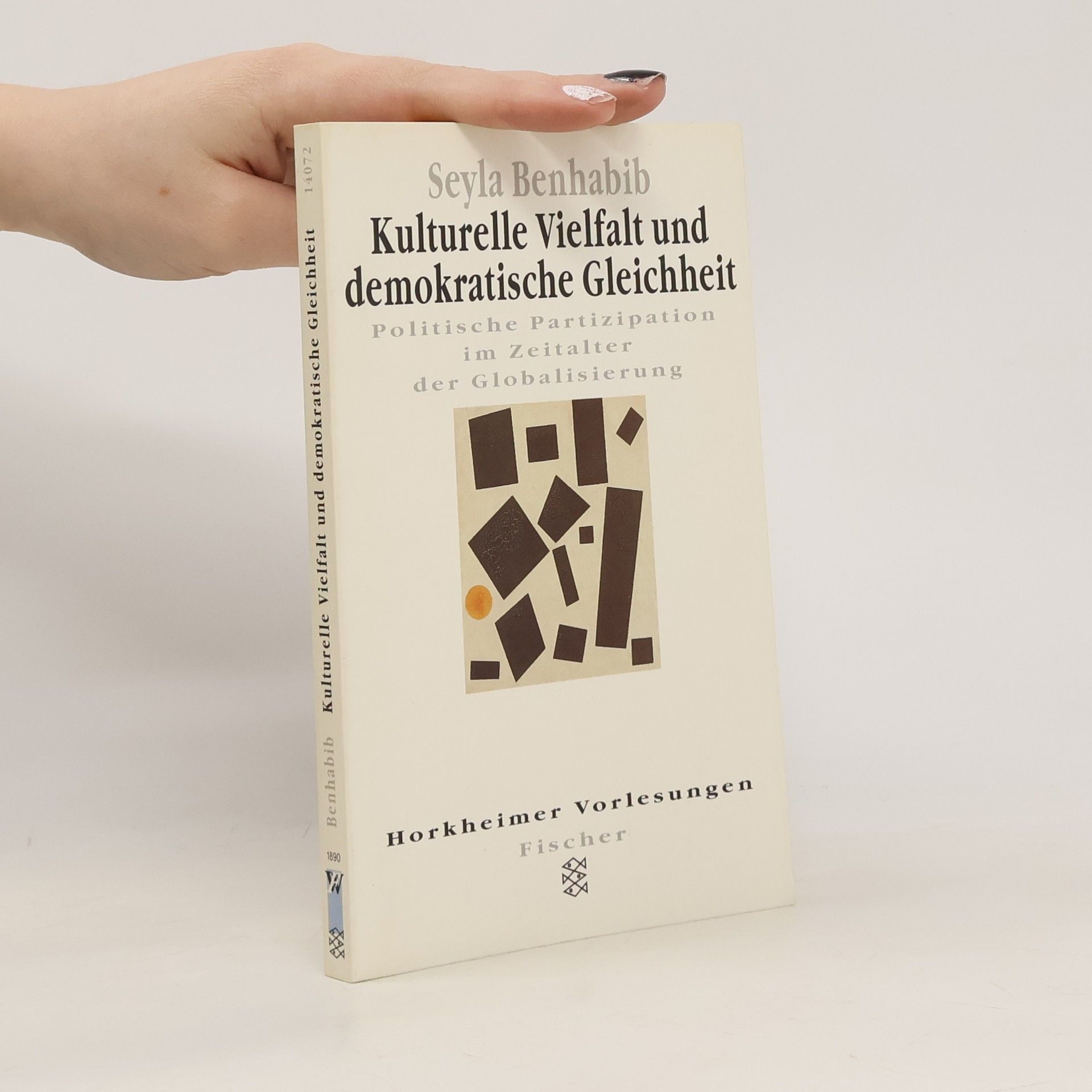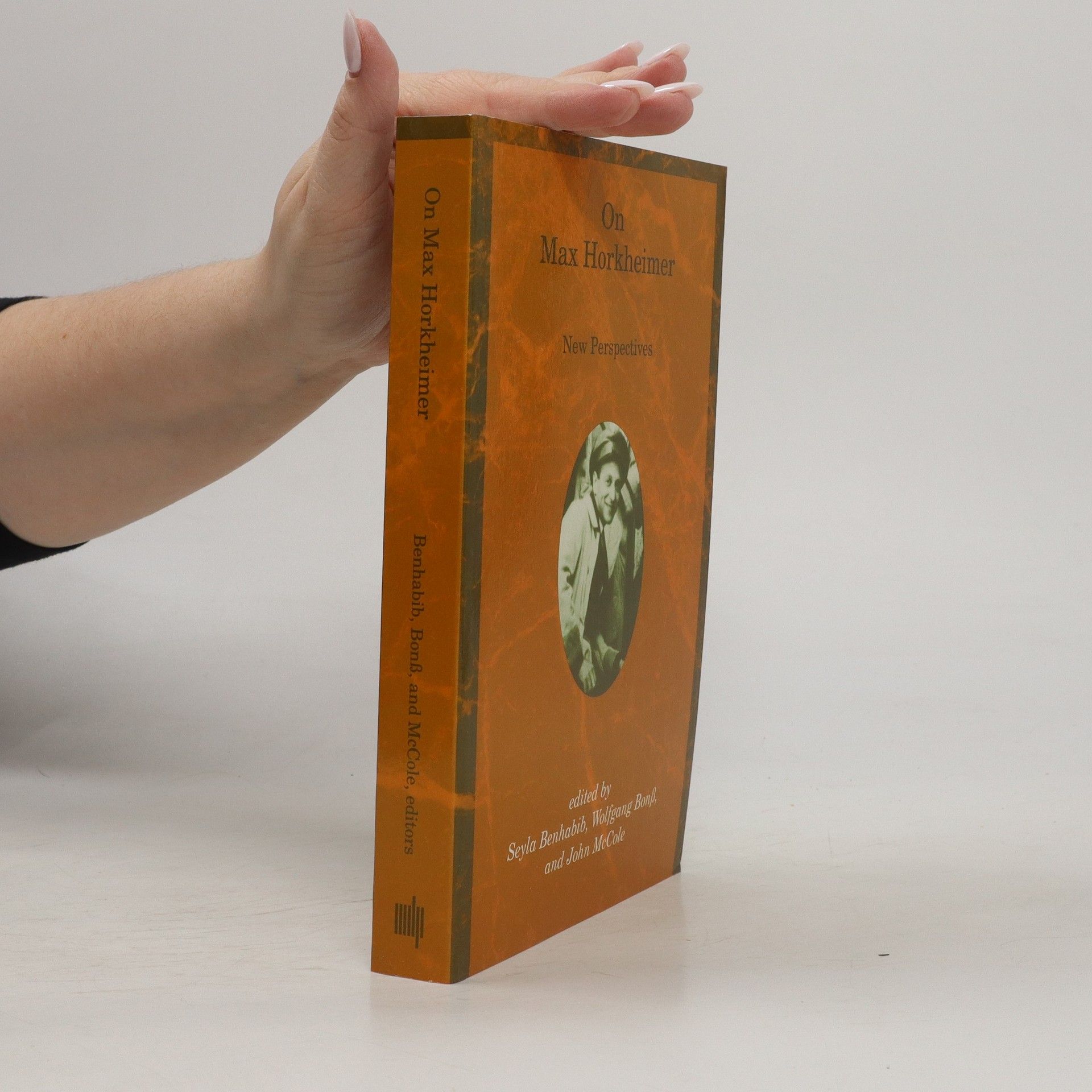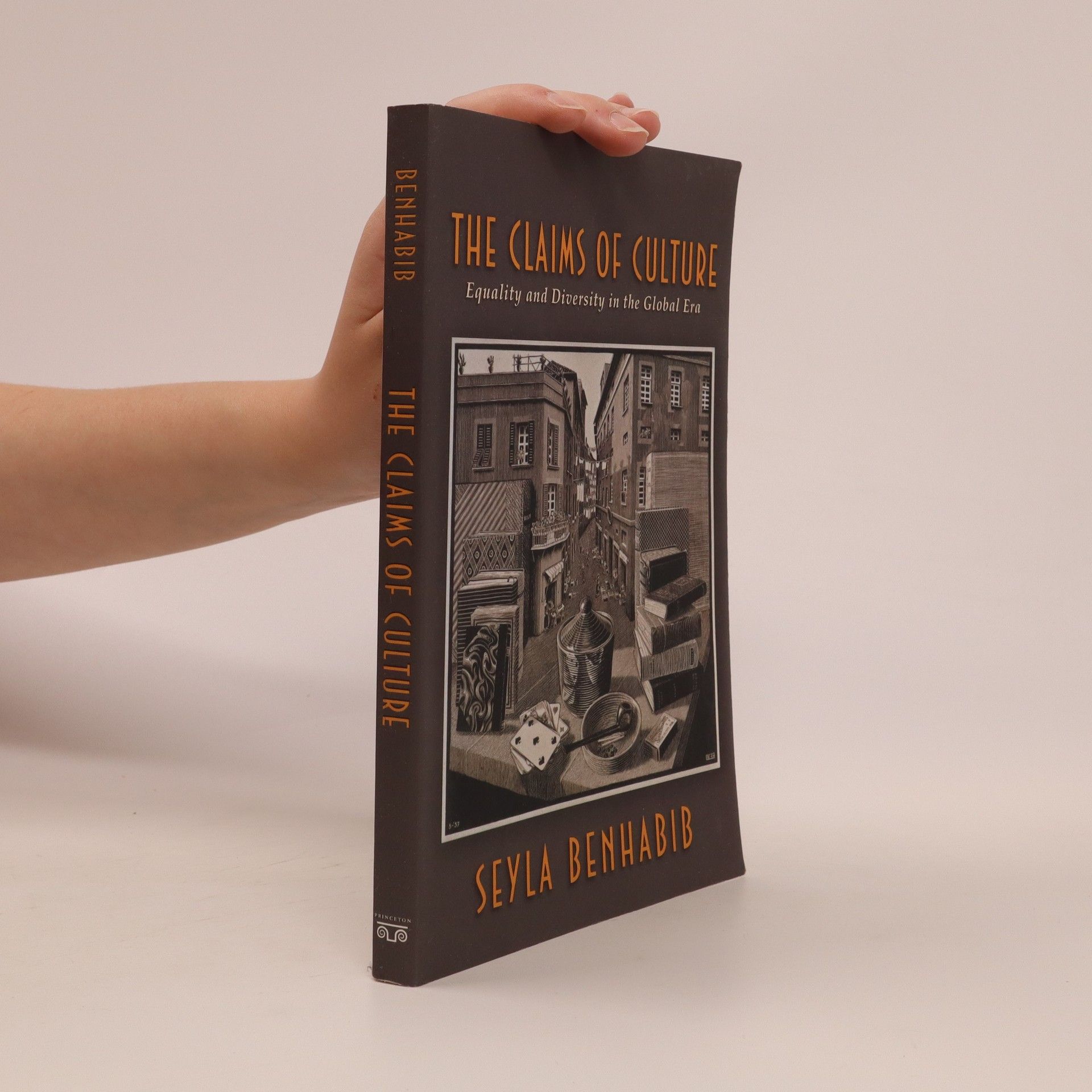The Rights of Others
- 264 páginas
- 10 horas de lectura
The Rights of Others examines the boundaries of political community by focusing on political membership.
Seyla Benhabib es una filósofa contemporánea reconocida por su trabajo integrando la teoría crítica y feminista. Su erudición a menudo se sumerge profundamente en las ideas de pensadores influyentes como Hannah Arendt y Jürgen Habermas. A través de su enfoque analítico, Benhabib contribuye a una comprensión matizada de la ética, la política y la economía.






The Rights of Others examines the boundaries of political community by focusing on political membership.
Analysing in detail the transformation of citizenship practices in European Union countries, Benhabib concludes that flexible citizenship, certain kinds of legal pluralism and models of institutional powersharing are quite compatible with deliberative democracy, as long as they are in accord with egalitarian reciprocity, voluntary self-ascription and freedom of exit and association.
Max Horkheimer (1895-1973), a key figure in critical theory, has gained renewed recognition in Germany over the past decade, particularly following the 1985 publication of his Collected Works. This collection of essays by German and American scholars aims to introduce English-speaking audiences to significant insights from Horkheimer's recent scholarship. Alongside a companion volume, it offers a comprehensive view of his contributions to modern social theory. The essays cover various aspects of Horkheimer's intellectual journey, including Alfred Schmidt's exploration of his intellectual physiognomy and Jurgen Habermas's remarks on the evolution of his work. Hauke Brunkhorst discusses Horkheimer's materialist critique of philosophy, while Wolfgang Bonss examines the interdisciplinary research that laid the groundwork for critical theory. Thomas McCarthy addresses the relationship between critical theory and philosophy, and Wolf Schafer analyzes Horkheimer's connections with John Desmond Bernal. Further contributions include Axel Honneth's critique of the sociological shortcomings in critical theory, Moishe Postone and Barbara Brick's insights into political economy, and Stefan Breuer's examination of the theoretical rifts between Horkheimer and Adorno. Other essays delve into Horkheimer's engagement with German idealism, his reflections on anti-Semitism, and the interplay between mass culture and aesthetic redemption, culm
Granica państwowa to zmyślne urządzenie. Jeśli znajdziesz się po niewłaściwej stronie, możesz w mig zmienić się z obywatela w kogoś obcego i pozbawionego praw. Tak jakby po przekroczeniu jej coś zmieniłoby cię w wybrakowany towar, niezasługujący na dobre traktowanie. Z drugiej strony granica to też gwarancja demokratycznej polityki, coś co pozwala zamkniętym nią ludziom decydować o prawach, polityce i moralności. Nie da się więc wymarzyć świata bez granic, ale też nie powinno się patrzeć jak cierpią ludzie, którzy akurat znaleźli się po niewłaściwej stronie, nielegalni emigranci, ludzie szukający schronienia przed wojną, biedą czy tacy, których państwa przestały istnieć. Seyla Benhabib w Prawach Innych proponuje jak pogodzić tę równoczesną konieczność i niemożliwość granic, jak uczynić „czymś płynnym i negocjowalnym”, różnicę między „obywatelami i obcymi, pomiędzy nami i nimi”.
Die globale Integration unserer Welt ist nicht in Abrede zu stellen. Doch die Kehrseite dieser Globalisierung ist ebenso unübersehbar: Im Namen vielfältiger kultureller Unterschiede - ethnischer, nationaler, sprachlicher, religiöser - formieren sich Gegenbewegungen von politischer Wirkmächtigkeit. Um ein genaueres Verständnis dieser neu sich artikulierenden Formen kollektiver Identität, dieser von Identität/Differenz bestimmten neuen politischen Bewegungen muß es einer Gesellschaftstheorie gehen, die angesichts der Dynamik aktueller sozialer und politischer Prozesse adäquate Formen politischer Partizipation entwerfen will. Bei der Frage, wie demokratische Identitäten im Zeitalter der Globalisierung gestaltet sein müßten, gilt besondere Aufmerksamkeit dem Problem der Staatsbürgerschaft und Einbürgerungsrechte, das abschließend in den Blick genommen wird.
Nationalstaatliche Grenzen definieren die einen als Mitglieder, die anderen als Fremde. Wenn aber die staatliche Souveränität zunehmend ausfranst und die nationale Staatsbürgerschaft immer mehr ausfasert, wie es im Gefolge der Globalisierung geschieht, dann werden auch ihre Definitionen immer unklarer. Hier sieht Seyla Benhabib eine der dringlichsten und problematischsten Aufgaben der heutigen Weltpolitik. In „Die Rechte der Anderen“ untersucht Benhabib die Prinzipien und Praktiken zur Einbindung von Fremden und Immigranten in die bestehende politische Praxis. Sie greift dabei auf aktuelle Beispielfälle zurück, unter anderem auf den »Kopftuchstreit« in Frankreich und Deutschland. Benhabib plädiert – im Sinne Kants – für einen moralischen Universalismus und kosmopolitischen Föderalismus. Sie tritt ein für durchlässige Grenzen – nicht für absolut offene –, wobei sie sich nicht nur für das Recht von Flüchtlingen und Asylsuchenden auf Aufnahme stark macht, sondern auch für das regulative Recht der Demokratien.
Die amerikanische Politikwissenschaftlerin Seyla Benhabib legt eine Rekonstruktion der politischen Theorie Hannah Arendts vor, die sich deren Werk gerade von ihren weniger bekannten Schriften her nähert. Dabei gelingt es Benhabib, die Spuren einer alternativen Genealogie der Moderne freizulegen. Über die Untersuchung des Spannungsverhältnisses zwischen Totalitarismusanalyse, den Einflüssen der Existenzphilosophie und der genuinen Methode Arendts findet Benhabib einen kritischen Zugang zu ihren Schriften, der auch deren Anschlussmöglichkeiten an aktuelle Debatten aufzeigt. Diese gibt es immer dort, wo es um Bürger- und Menschenrechte, Zivilgesellschaft und politische Öffentlichkeit geht.
In ihrem Beitrag zur renommierten Vorlesungsreihe der Tanner Lectures beschäftigt sich Seyla Benhabib mit der Spannung zwischen universellen Menschenrechten und dem jeweils nur beschränkt gültigen Gesetz demokratischer Staaten. Mit Blick auf legale und illegale Immigranten, die in Staaten leben, von deren Gemeinwesen sie jedoch häufig ausgeschlossen sind, fragt sie, ob diese nicht eigentlich durch Menschenrechtsprinzipien geschützt sein müssten, die über der Gesetzgebung einzelner Staaten stünden. Die Versöhnung beider Prinzipien bestehe darin, so Benhabib, universelle Normen nach und nach in die Gesetzgebung von Demokratien einfließen zu lassen. Eine universelle Geltung solch kosmopolitischer Normen jenseits demokratischer Rechtssysteme im Sinne eines Weltstaatsmodells sei hingegen nicht denkbar. Ergänzt und kritisch diskutiert werden ihre Thesen von Bonnie Honig, Jeremy Waldron und Will Kymlicka.
Menschenrechte in unruhigen Zeiten
Auch wenn »globale Menschenrechte« mittlerweile zum Standardrepertoire des politischen Diskurses gehören, ist ihre philosophische Rechtfertigung nach wie vor umstrittenes Gebiet. Für manche sind Menschenrechte das Trojanische Pferd, mit dem der Westen seinen neoliberalen way of life in alle Welt zu exportieren trachtet, andere wiederum verbinden mit der Idee einer Weltbürgerschaft mit verbrieften Rechten einen unzulässigen Eingriff in die Souveränität demokratischer Staaten. Seyla Benhabib entwickelt in ihrem Buch ein diskursethisches Instrumentarium, um solche falschen Gegensätze zu überwinden. Anhand zahlreicher Beispiele – Kopftuchstreit, Flüchtlingspolitik, humanitäre Interventionen – zeigt sie Wege zu einem engagierten, kontextsensitiven demokratischen Kosmopolitismus jenseits von Interventionismus und Indifferenz.
Zwischen Demos, Kosmos und Globus. IWM-Vorlesungen 2023
Seit den letzten beiden Jahrzehnten des 20. Jahrhunderts ist ein starkes Interesse am Kosmopolitismus in den Sozial-, Kultur- und Rechtswissenschaf ten zu verzeichnen. Allerdings hat der Kosmopolitismus seit Beginn des neuen Jahrhunderts einen schweren Stand. Vor diesem Hintergrund formuliert Seyla Benhabib den Kosmopolitismus neu. Im Fokus ihrer Überlegungen steht die Frage, wie wir ihn in der heutigen Welt zusammen mit dem Bemühen um Gerechtigkeit im Globalen Süden und dem Streben nach planetarischer Nachhaltigkeit neu denken können. Benhabib geht den zeitgenössischen Kritiken am Kosmopolitismus nach und kommt zum Schluss, dass es weiterhin möglich ist, den Kosmopolitismus zu verteidigen, indem man ihn von der Geschichte des westlichen Kapitalismus und dem Zeitalter des Imperialismus und Kolonialismus loslöst. Sie grenzt den Kosmopolitismus von gängigen liberalen normativen Modellen unserer Zeit klar ab, und zeigt auf, dass allein der Kosmopolitismus die Fortschritte im Bereich der internationalen Menschenrechte integrieren kann. Nicht zuletzt plädiert sie für ein Verständnis von Kosmopolitismus, in dem auch das neue planetarische Bewusstsein, das im Gefolge der ökologischen Katastrophen unserer Zeit entsteht, seinen Niederschlag findet.